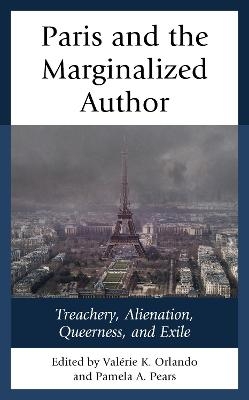
Paris and the Marginalized Author
Lexington Books (Verlag)
978-1-4985-6703-9 (ISBN)
This volume of essays explores what it is that has brought marginalized and often exiled writers, seen as treacherous, alienated, and/or queer by their societies and nations together by way of Paris. Spanning from the inter-war period of the late 1920s to the present millennium, this volume considers many seminal questions that have influenced and continue to shape the realm of exiled writers who have sought refuge in Paris in order to write. Additionally, the volume’s essays seek to define alienation and marginalization as not solely subscribing to any single denominator -- sexual preference, gender, or nationality-- but rather as shared modes of being that allow authors to explore what it is to write from abroad in a place that is foreign yet freed of the constrictions of one’s home space. What makes Paris a particularly fruitful space that has allowed these authors and their writings to cross national, ethnic, racial, religious, and linguistic boundaries for over a century? What is it that brings together writers such as Moroccan Abdellah Taïa, Americans James Baldwin, Richard Wright and, most recently, Ta-Nehisi Coates and Shay Youngblood, Algerian Nabile Farès, Franco-Algerian Leila Sebbar, Canadian Nancy Huston, French Jean Genet and French-Vietnamese Linda Lê? How do their representations and understanding of transgression and marginalization transcend national, linguistic and ethnic boundaries, leading ultimately to revolution, both literary and literal? How does their writing help us to trace the history of Paris as a literary and artistic capital that has been useful for authors’ exploration of the Self, race and home country? These are but a few of the many questions explored in this volume.
This book relies on an inherently intersectional approach, which is not based in reified identities, whether they be LGBT, postcolonial, ethnic, national, or linguistic. Instead, we posit that, for example, queer theory, and a “politics of difference”i can help us investigate the dynamics of these multiple identity positions, and hence provide a broader understanding of the lived experiences of these writers, and, perhaps, their readers from the early 1940s to the present.
Valérie K. Orlando is professor of French and Francophone literatures in the Department of French & Italian at the University of Maryland, College Park. Pamela A. Pears is professor of French at Washington College.
Acknowledgments
Introduction: Paris and the Marginalized Author: Treachery, Alienation, Queerness and Exile
Valérie K. Orlando and Pamela A. Pears
Part I: 1919–1950s : From the Parisian Harlem Renaissance to the Beginning of “The 30 Glorieuses”
Chapter 1: Gwendolyn Bennett and Her Paris Idyll
T. Denean Sharpley-Whiting
Chapter 2: From Alienation to Activism: Richard Wright, Jean Genet, and the Black Panthers
Pamela A. Pears
Part II: 1960s-1970s: The Algerian War, Identity Politics and Postcolonial Immigration
Chapter 3: A Mexican in Paris from the 1940s to Algerian Independence: Elena Garro’s Testimonios sobre Mariana, Reencuentro de personajes, Mi hermanita Magdalena
Sandra Messinger Cypess
Chapter 4: No Name in the Street for Passengers in the West: Nabile Farès, James Baldwin, and Conversations of Alienation
Valérie K. Orlando
Chapter 5: No More Eden: The Place of Diasporic Encounters in Paris Noir Fiction
Laila Amine
Part III: 1980s-1990s: Intersectional feminism, Capitalist Globalization and la francophonie, writ large?
Chapter 6: De rive en rive: Exile, Space, and Memory in Nancy Huston’s L’empreinte de l’ange
Aparna Nayak
Chapter 7: Packing an Epistolary Punch: Nancy Huston and Leïla Sebbar’s Parisian Proximities in Lettres parisiennes: Autopsie de l’exil
Alison Rice
Chapter 8 : Sur les pas de Linda Lê: Paris, Exilic Heterotopia
Leslie Barnes
Part IV: 2000s: The New Millennium: Transnationalism, Conversations beyond France
Chapter 9: The Right to Paris: Migrants’ Narratives in Shay Youngblood’s Black Girl in Paris and Évelyne Trouillot’s La Mémoire aux abois
Norrell Edwards
Chapter 10: The Place of Paris in Vietnamese Diasporic Fiction
Karl Ashoka Britto
Chapter 11 : “ Je suis terroriste, pédé et le fils de Marilyn Monroe”: Cinematic Stars, Strife, and Queer Filiation in Abdellah Taïa’s Infidèles (2012)
Denis M. Provencher
Chapter 12: Louis-Philippe Dalembert and the Haitian Intellectual Tradition in Paris
Félix Germain
Chapter 13: Bernardo Toro: Beyond Lieux Communs
Laura Reeck
Bibliography
About the Contributors
| Erscheinungsdatum | 10.05.2021 |
|---|---|
| Reihe/Serie | After the Empire: The Francophone World and Postcolonial France |
| Co-Autor | Laila Amine, Dr. Leslie Barnes, Sandra Messinger Cypess |
| Verlagsort | Lanham, MD |
| Sprache | englisch |
| Maße | 159 x 231 mm |
| Gewicht | 517 g |
| Themenwelt | Geisteswissenschaften ► Sprach- / Literaturwissenschaft ► Anglistik / Amerikanistik |
| Geisteswissenschaften ► Sprach- / Literaturwissenschaft ► Literaturwissenschaft | |
| Geisteswissenschaften ► Sprach- / Literaturwissenschaft ► Romanistik | |
| ISBN-10 | 1-4985-6703-7 / 1498567037 |
| ISBN-13 | 978-1-4985-6703-9 / 9781498567039 |
| Zustand | Neuware |
| Haben Sie eine Frage zum Produkt? |
aus dem Bereich


